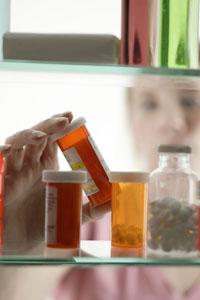
This post is updated ahead of each take-back day. It was last updated January 3, 2023.
With all of the prescriptions that come with a cancer diagnosis, at some point, opening your medicine cabinet or that overflowing drawer (you know the one I mean) becomes more like opening a cancer treatment time capsule. But what do you do with all of those pills, tablets, and patches you don’t need anymore? You actually have more options than you may think.
Option 1: Let the experts handle it.
The U.S. Drug Enforcement Administration sponsors periodic national prescription drug take-back days with collection sites around the country. During these events, people can bring unused or expired medications to a central location where they can be disposed of safely. The next take-back day is Saturday, October 28, 2023, from 10 a.m. to 2 p.m. Search for a collection site in your local area or call 800-882-9539 for more information.
Alternatively, some local government agencies, doctors' offices, and pharmacies have programs or protocols in place for collecting medications. Talk with your city or county government's household trash and recycling service, doctor’s office, or pharmacist about drug take-back options in your community.
Option 2: Dispose of them yourself.
If you decide to take the matter into your own hands, you should always follow the disposal instructions found on the drug label or the patient information leaflet that comes with the prescription. Do not flush medicines down the toilet or sink unless this information specifically tells you to.
The FDA lists a number of medications that should always be flushed to protect people and pets from accidental poisoning. Just one dose of these medications can be extremely harmful, or even deadly, if they are used by someone besides the person for whom they were prescribed.
However, some communities have rules and restrictions against flushing medications, as the chemical components can filter into the groundwater and potentially affect the environment. When in doubt, check with your local water treatment and/or sanitation department.
If you can’t take your medication to a disposal location or flush it, you may need to put it in the trash. To do so, the FDA recommends following these important steps:
-
Take all of the medication out of its container.
-
Put the medication in a sealable container, such as a plastic bag or coffee can.
-
Mix the medication with an undesirable substance such as cat litter or used coffee grounds. Do not crush pills, tablets, or capsules.
-
Seal the container and be sure to put it in the trash, not the recycling.
-
Remove the label or completely cross out any personal information before putting an empty container in the recycling bin or trash. This will help protect your identity and the privacy of your health information.
Option 3: Donate them.
According to the National Conference of State Legislatures, as of 2012, at least 38 states and Guam had passed drug donation laws. States such as, Colorado, Florida, Kentucky, Michigan, Nebraska, and Wisconsin, have created programs specifically for collecting and redistributing cancer-related prescription drugs to eligible patients.
Not all of these laws or programs are currently operational, and every state has their own, often strict, rules on who can donate and what types of prescription medications may be donated. However, here are some general donation guidelines:
-
In many states, only a health facility or pharmacy is allowed to donate drugs. There are some states that allow patients to donate.
-
Usually the packaging must be unopened and sealed, or the drugs must be packaged in individual doses (usually in sealed blister packs).
-
Expired drugs and controlled substances are never accepted.
-
In general, you cannot receive payment for donated drugs.
If you have additional questions about disposing of unused or expired medications, talk with your pharmacist or doctor to see what options are available. You can also call the FDA at 888-INFO-FDA (888-463-6332).

View a full-sized version of this infographic at the U.S. Food and Drug Administration website.
